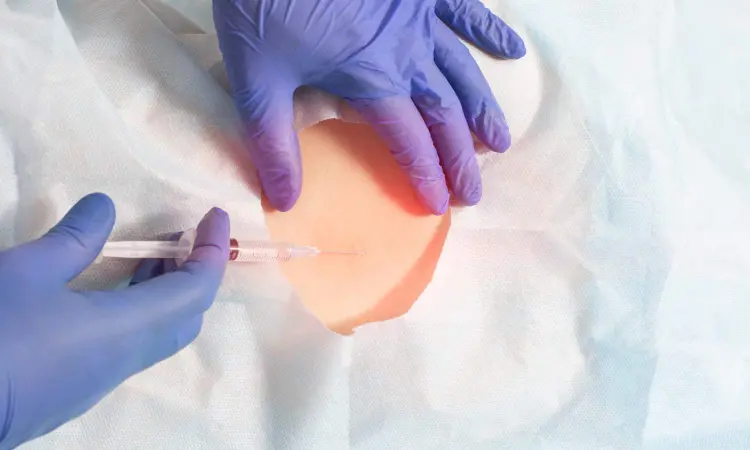- Home
- Medical news & Guidelines
- Anesthesiology
- Cardiology and CTVS
- Critical Care
- Dentistry
- Dermatology
- Diabetes and Endocrinology
- ENT
- Gastroenterology
- Medicine
- Nephrology
- Neurology
- Obstretics-Gynaecology
- Oncology
- Ophthalmology
- Orthopaedics
- Pediatrics-Neonatology
- Psychiatry
- Pulmonology
- Radiology
- Surgery
- Urology
- Laboratory Medicine
- Diet
- Nursing
- Paramedical
- Physiotherapy
- Health news
- Fact Check
- Bone Health Fact Check
- Brain Health Fact Check
- Cancer Related Fact Check
- Child Care Fact Check
- Dental and oral health fact check
- Diabetes and metabolic health fact check
- Diet and Nutrition Fact Check
- Eye and ENT Care Fact Check
- Fitness fact check
- Gut health fact check
- Heart health fact check
- Kidney health fact check
- Medical education fact check
- Men's health fact check
- Respiratory fact check
- Skin and hair care fact check
- Vaccine and Immunization fact check
- Women's health fact check
- AYUSH
- State News
- Andaman and Nicobar Islands
- Andhra Pradesh
- Arunachal Pradesh
- Assam
- Bihar
- Chandigarh
- Chattisgarh
- Dadra and Nagar Haveli
- Daman and Diu
- Delhi
- Goa
- Gujarat
- Haryana
- Himachal Pradesh
- Jammu & Kashmir
- Jharkhand
- Karnataka
- Kerala
- Ladakh
- Lakshadweep
- Madhya Pradesh
- Maharashtra
- Manipur
- Meghalaya
- Mizoram
- Nagaland
- Odisha
- Puducherry
- Punjab
- Rajasthan
- Sikkim
- Tamil Nadu
- Telangana
- Tripura
- Uttar Pradesh
- Uttrakhand
- West Bengal
- Medical Education
- Industry
Epidural Analgesia Lowers Risk of Severe Perineal Tears in First-Time Mothers: Study

Researchers have established that epidural analgesia, at the expense of augmenting small perineal tears marginally, significantly decreases the risk of extreme perineal injury among primiparous women undergoing vaginal delivery. The results assist in demystifying the long-discussed interaction between epidural administration and perineal outcomes of delivery. The study was published in the International Journal of Obstetrics & Gynecology by Omri D. and colleagues.
The research was a tertiary care hospital-based large-scale retrospective cohort analysis from 2012 to 2024. It consisted of 45,132 primiparous women with singleton, term, vertex, and vaginal deliveries. Out of these, 36,799 (81.5%) were given epidural analgesia during labor. Propensity score matching was utilized on a 1:1 basis, and there were 5,974 women in each group for comparison of epidural and non-epidural delivery.
Maternal and obstetric factors were controlled to reduce confounding factors. The outcomes measured were any injury to the perineum and OASI, and the results were analyzed with standardized mean difference (SMD) and multivariable logistic regression. SMD of less than 0.1 was regarded as negligible, 0.1 to 0.2 as small, and greater than 0.2 as clinically significant.
Results
• Following matching, the baseline characteristics of the two groups were generally similar, apart from fetal head station at full dilation, which was raised marginally in the non-epidural group (0.90 ± 0.9 vs. 0.66 ± 0.8; SMD = 0.239).
•Perineal trauma was experienced by 82.2% of the women who were given epidural analgesia but only 78.2% of those who were not, demonstrating a small difference (SMD = 0.10).
• Upon further analysis, epidural use was identified to be linked with an increased risk of minor perineal trauma only in the absence of any episiotomy (aOR 1.321; 95% CI: 1.225–1.425; P < 0.001).
• This association is lost when episiotomy was undertaken.
• On the other hand, epidural analgesia was protective against OASI in both instances, with or without an episiotomy.
• The adjusted odds ratio was 0.492 (95% CI: 0.285–0.849; P = 0.011) with episiotomy and 0.592 (95% CI: 0.424–0.825; P = 0.002) without episiotomy.
Epidural analgesia in term vaginal delivery for primiparous women was linked with a minimal increase in minor perineal trauma but with a significant reduction in obstetric anal sphincter damage. The results confirm the safety and possible protective effect of epidural use with respect to severe perineal trauma. In summary, epidural analgesia continues to be an excellent option to administer pain in labor without jeopardizing perineal outcomes.
Reference:
Dominsky, O., Attali, E., Amikam, U., Gold, R., Greenberger, C., Yogev, Y., & Baruch, Y. (2025). The association between epidural analgesia and perineal injury in primiparous women: A propensity score-matched cohort study. International Journal of Gynaecology and Obstetrics: The Official Organ of the International Federation of Gynaecology and Obstetrics, ijgo.70578. https://doi.org/10.1002/ijgo.70578
Dr Riya Dave has completed dentistry from Gujarat University in 2022. She is a dentist and accomplished medical and scientific writer known for her commitment to bridging the gap between clinical expertise and accessible healthcare information. She has been actively involved in writing blogs related to health and wellness.
Dr Kamal Kant Kohli-MBBS, DTCD- a chest specialist with more than 30 years of practice and a flair for writing clinical articles, Dr Kamal Kant Kohli joined Medical Dialogues as a Chief Editor of Medical News. Besides writing articles, as an editor, he proofreads and verifies all the medical content published on Medical Dialogues including those coming from journals, studies,medical conferences,guidelines etc. Email: drkohli@medicaldialogues.in. Contact no. 011-43720751


